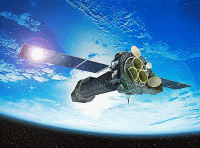|
XV CANARY ISLANDS WINTER SCHOOL OF ASTROPHYSICS
"PAYLOAD
AND MISSION DEFINITION
IN SPACE SCIENCES"
|
 |

The XV Canary Islands Winter
School of Astrophysics (WS), organized by the Instituto de Astrofísica
de Canarias (IAC), will be dedicated to instrumentation for space sciences
in a broad sense with an emphasis on the missions included in the newly released
ESA Cosmic Vision 2020 program. The WS focuses on how the scientific drivers
impact the definition of the missions and their payloads. The WS welcomes
a maximum of 70 PhD students and young Post-Docs, and provides each year a
unique opportunity for the participants to broaden their knowledge in a key
field of Astronomy.
This year WS on instrumentation
for space astronomy will provide firm ground for young researchers that will
play a key role in the development of future spacecrafts. Attention will be
paid in particular to those missions that are included in the ESA program Cosmic
Vision 2020 (which will be formally introduced by ESA D/Sci Prof. David Southwood).
Being a scientifically driven school, the starting point will be how the science
drivers define the missions and their instrumentation. But it will also show
how the technology limitations imposed by the space environment severely constrains
the scientific scope of the missions. The WS will address traditional topics
for space research as interplanetary medium in-situ measurements, planetary
exploration and the detection of electromagnetic windows unobservable from the
ground (Gamma-, X-ray and UV). However, and as spacecrafts like HST and SOHO
have shown, observations in visible wavelengths greatly benefit from the absence
of atmospheric turbulence and continuous observations. Thus, the WS will also
cover visible and IR observations as planned in a number of future missions.
Cosmic Vision 2020 missions included here are Rosetta, Mars and Venus Express,
Bepi Colombo, Solar Orbiter, Herschel, Planck, Eddington, JWST, Gaia and the
future projects Xeus and Darwin. The WS also focuses on the general problems
related to every mission such as launchers, orbits, service modules and ground
segment. These topics provide the programmatic boundaries of the missions that,
in contrast to ground astronomical instrumentation, greatly influence space
instrumentation in crucial ways.
To achieve all these goals the
WS will bring together a set of eminent scientists that are actively working
on the definition of future missions and that have also played key roles in
missions that are successfully flying and increasing our understanding of the
Universe. The contents of the school should give the students a balanced and
varied introductory background to the field. They should be suitable for those
interested primarily in either the scientific or technical aspects of our topic.
Participants of the WS will have the opportunity to show their current field
of work by presenting a poster contribution (1m square panels). Dedicated poster
sessions will be organized within the WS.
The WS will take place in Puerto
de la Cruz (Tenerife, Canary Islands, Spain). The invited lecturers are eight
prestigious researchers working in several areas of the general topic of space
sciences instrumentation. The lectures will be delivered in English and will
be published subsequently in a specially dedicated volume. Speakers will develop
their topics in a series of five lectures. Visits to the IAC's Headquarter in
La Laguna, the Teide Observatory in Tenerife and the Roque de los Muchachos
Observatory in La Palma will be scheduled as part of the WS activities.
The registration fee is Euro 1100.-,
which covers the Conference Fee (Euro 400.-) and half-board accommodation. Other
WS activities and a copy of the book will be provided at no additional charge.
Those interested in attending
the WS should send a Curriculum
Vitae, a short summary of their current research project and
a letter of reference from their
thesis advisor, or Head of Department, to the address below. These should reach
the IAC before . Selected
candidates will be informed by July 30th. You may register using the attached
forms or, electronically, at the WS Web site given below.
The Instituto de Astrofísica
de Canarias has applied for financial support to the European Commission (EC)
under the Marie Curie Conference and Training Courses Action of the Sisth Framework
Programme (FP6) to support early stage researchers and young postdocs to attend
this WS. You are invited to apply for these EC grants to attend the event. The
availability of these funds will not be confirmed (or otherwise) until August.
Applicants from any country and nationality
are invited to complete the application form
provided here.
LECTURERS and TOPICS:
Prof. André BALOGH: Measurement
of electromagnetic fields and particles in space.
Prof. Angioletta CORADINI: Planetary
observations and landers.
Prof. Richard HARRISON: EUV and UV imaging
and spectroscopy from space.
Prof. Yves LANGEVIN: Design issues for
space science missions.
Prof. Mark McCAUGHREAN: Space infrared
astronomy.
Prof. Victor REGLERO: Gamma and X ray
instrumentation.
Dr. Gerhard SCHWEHM: Spacecraft and ground
segment.
Dr. Ted TARBELL: Visible light telescopes
and instruments for space observations.
In addition, Prof. Alvaro
Giménez (Head of RSSD, ESA/ESTEC) will give a two hours lecture on:
Basic steps in designing a space mission and making a proposal

Contact: Ms. Nieves
Villoslada - Ms. Lourdes
González
Fax: + 34 922 605210
E-mail: xvwinter@ll.iac.es
Internet: https://www.iac.es/winschool2003/info.html
[ Main Page] - [ IAC]
© Instituto de Astrofisica de Canarias
2003
Send Comments to Nieves Villoslada
- Lourdes González xvwinter@ll.iac.es

![]()